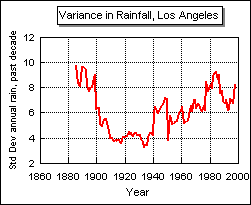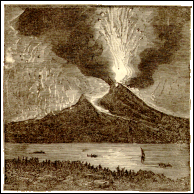|
Now I should say that the relation of volcanic action and the subsequent coldness of the seasons was not a great surprise to us, even in our simple times, for we and our forbearers had the habit of recording our observations of natural events with an attention to detail that might strike some of your contemporaries as finnicky in your busy times. The eruption of the Icelandic Laki in June of 1783 had been notable; so severe had been the volcanic haze that spread that summer, across Europe and into the Middle East, that there followed a bitter winter felt even as far as America, where Benjamin Franklin correctly attributed the severity of the season to the loss of sunlight from that same volcanic haze. Careful analysis of the event shows that the temperature fell for several years, even though the haze itself lasted no more than several months. So the record, a century before my time, tells us of the potency of these volcanos. Similarly the great eruption of 1815, a subject on which I heard much as a boy, led to a year in which there was no summer. The few years following the Krakatoa explsion of 1883
provided a glimpse of the climate disturbances that can result from even
moderate volcanism. Heavy rains fell for the next three years -- a remarkable
thirty eight inches in Los Angeles in the following winter alone-- followed
by anomalous droughts spreading from It should be no surprise that even the financial markets were affected. In 1884 there was a major panic in American stock markets. Only recently has it been shown that in that same year, 1884, there had occurred an El Nino episode of great proportions. I saw the lasting effects of the eruption even greater
degree when I arrived in Ireland five years later, in 1888; it was my only
visit to the land of my ancestors. I found it wet and gloomy enough, but
was told by the natives that it was even worse than usual. I was fifty
seven years old that year and my mood was as low as the weather. My book
Ragnorak
was selling poorly and I was disappointed at the reception given to my
lectures on Shakespeare (though I was pleased to find Oscar Wilde and the
Prime Minister in my audience). After chilly London I found myself greatly
disheartened by my visit to that poor, oppressed, God-forsaken land of
my ancestors. My future, at age fifty eight, looked lost and gloomy, and
I felt that I could only grind my teeth and cry to heaven.
|
 n August of 1883,
shortly after my fiftieth birthday, a remarkable event took place. The
Indonesian volcano Krakatoa exploded, coughing two hundred and ninety four
million tons of sulfuric acid into the atmosphere. This violent paroxism
is now thought by some of your scientists to have been the equal of the
n August of 1883,
shortly after my fiftieth birthday, a remarkable event took place. The
Indonesian volcano Krakatoa exploded, coughing two hundred and ninety four
million tons of sulfuric acid into the atmosphere. This violent paroxism
is now thought by some of your scientists to have been the equal of the
 west
to east. Note as a measure of this eccentricity the high variance of rainfall
in you Los Angeles record. Floods, too, plagued the world for the next
decade. Nor was this calamitous impact confined to the New World; in Baghdad
there was no rain whatsoever those years. Then, as if the skies were recovering,
in the manner of a stretched elastic band, a wave of erratic floods
swept the world in the late 1880s. In the American western plains cattle
had died by the thousands as the plains were seared by drought; soon enough
these lands were pounded by blizzards in 1886 and 1887. That same year
brought an oddly summery winter to the East, with trees budding in Central
Park, a freakish warmth terminating with a mid March blizzard that
would go into history as The Great White Hurricane, horses
west
to east. Note as a measure of this eccentricity the high variance of rainfall
in you Los Angeles record. Floods, too, plagued the world for the next
decade. Nor was this calamitous impact confined to the New World; in Baghdad
there was no rain whatsoever those years. Then, as if the skies were recovering,
in the manner of a stretched elastic band, a wave of erratic floods
swept the world in the late 1880s. In the American western plains cattle
had died by the thousands as the plains were seared by drought; soon enough
these lands were pounded by blizzards in 1886 and 1887. That same year
brought an oddly summery winter to the East, with trees budding in Central
Park, a freakish warmth terminating with a mid March blizzard that
would go into history as The Great White Hurricane, horses  and
U.S. Senators perishing alike in twenty foot drifts that howled through
the eastern seaboard. The following Spring weird rains blew out a
dam at Johnstone, Pennsylvania, drowning thousands. On the other
side of the world the Yellow River spilled its banks violently, drowning
nearly a million Chinese.
and
U.S. Senators perishing alike in twenty foot drifts that howled through
the eastern seaboard. The following Spring weird rains blew out a
dam at Johnstone, Pennsylvania, drowning thousands. On the other
side of the world the Yellow River spilled its banks violently, drowning
nearly a million Chinese.